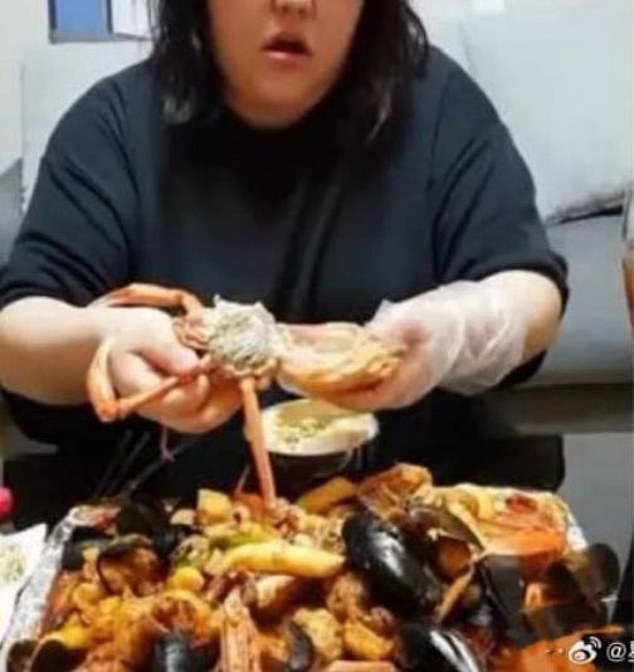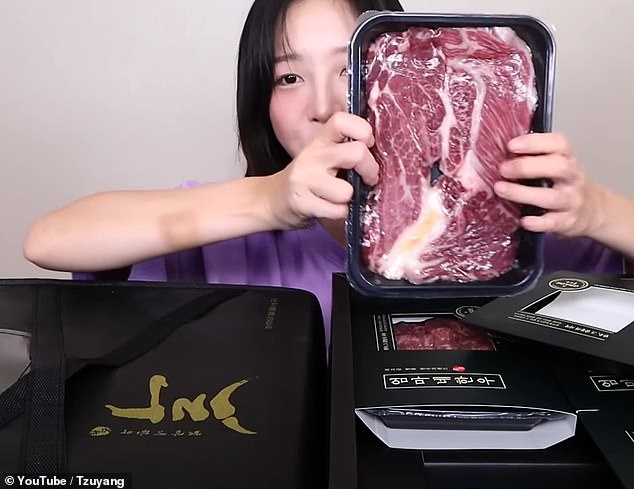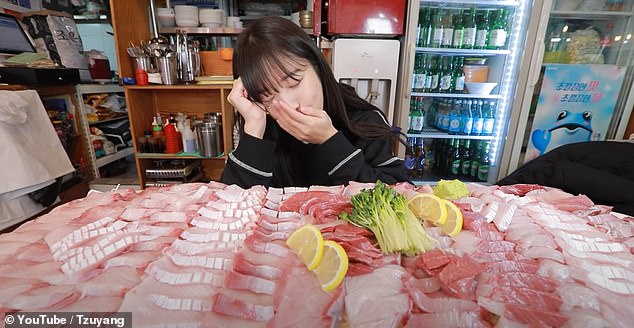China has issued a new warning against live streamers and mukbang content creators in a bid to crack down on food waste in the country.
Last week, the Beijing Municipal Administration for Market Regulation imposed 31 new guidelines targeting influencers, including extreme eaters, whose content promotes “fandom culture” and “money worship,” according to The telegraph.
The term “mukbang” comes from the South Korean word “meok-bang,” which means “live eating.” Influencers often spend hours in front of a camera consuming large amounts of food while interacting with the audience.
The controversial videos, which in extreme cases have been linked to deaths, could be banned by the Chinese Communist Party, putting the country’s 15.8 million livestreamers out of work.
What may have started as an innovative strategy for creators to boost their popularity and online wallets has quickly become a dark sub-industry that some experts say glorifies self-harm and, worse, death.
China has issued a new warning against content creators and mukbang livestreamers in a bid to crack down on food waste in the country (pictured: mukbang influencer Park Jung-won, 27, from South Korea)
Last month, popular livestreamer Pan Xiaoting from China died while broadcasting a 10-hour food binge consisting of cake, chicken strips and seafood to thousands of her followers.
The morbidly obese streamer succumbed to complications from a suspected stomach tear while gorging himself on 10kg (22lbs) of food, including what appeared to be a chocolate cake.
The Beijing Municipal Administration for Market Regulation is also cracking down on videos that are “traffic-driven,” including those of “fandom worship” and those with “abnormal aesthetics,” in a bid to restrict “effeminate” culture among men.
The trend has become increasingly extreme, with mukbangers eating larger amounts of often unhealthy food, leading doctors to warn that more people could die.
Xiaoting is not the first creator to lose their life at a tragically young age as a result of eating for views.
In January 2023, TikTok star Taylor Brice LeJeune (known online as Waffler69), who had around 1.7 million followers on the platform, died of a suspected heart attack.
Taylor, who was just 33 at the time of his death, was known for his quirky food review videos, in which he consumed novelty foods and expired grocery products, including promotional Addams Family cereal from the 1990s.
Large quantities of canned cheeseburgers and a giant Froot Loop were among the foods he consumed online.
Speaking to MailOnline after Taylor’s death, British GP Dr Zak Uddin said: “We’re not on the cusp of an obesity epidemic, we’re well into the epidemic.
“It’s crazy that we glorify excessive calorie consumption or even binge eating, isn’t it? We’re normalizing the abnormal.

Last week, the Beijing Municipal Administration for Market Regulation imposed 31 new guidelines targeting influencers, including extreme eaters, whose content promotes “fandom culture” and “money worship” (pictured: China’s Pan Xiaoting, who recently died while streaming a 10-hour eating binge).

Pan Xiaoting had recently suffered from stomach bleeding caused by the trauma of overeating.
“As a society, we enjoy the abnormal or the obscene. It’s not new. If it’s a freak show, people will be drawn to it.”
And last week, it was reported that a South Korean YouTuber with more than 10 million followers revealed she was a victim of the mukbang lifestyle, after claiming she was brutally beaten and forced to film extreme eating videos.
Park Jung-won, 27, known to fans as Tzuyang, quickly became an online hit after filming herself eating up to 30,000 calories a day.
The clips show restaurant staff looking shocked as the petite woman put away dozens of bowls and trays of food with a smile on her face.
But last month, the social media star shocked viewers by admitting she had been a victim of domestic violence for years and had been extorted by her ex-boyfriend for a sum of money her lawyers claimed amounted to 4 billion won (£2.3m).
Criminal cases were filed against him, but have since been dropped because he took his own life, Reuters reported.

Fans expressed concern over what they believed to be bruises in old videos (pictured right) on Tzuyang’s arm. The social media star then shocked viewers after claiming she was brutally beaten and forced to film extreme eating videos.

Another extreme eating content creator who lost their life at a tragically young age was Taylor LeJeune (pictured), who was 33 when she died of a suspected heart attack.
In a livestream on July 11, Tzuyang said her ex hit her on the body “because it would be too obvious on the face” and recounted the horrible past that led her to create her YouTube channel.
Now doctors and medical experts are warning of the extreme dangers associated with mukbangs, while the Chinese government has linked worship of such content to an economic downturn, the Telegraph reported.
He also revealed that Chinese President Xi Jinping has cracked down on “traffic-generated” content, such as viral mukbangs that seek to generate revenue and sponsorships, at a time of high youth unemployment and an unstable property market.
The regulations were partly imposed in 2020 when China drafted a new anti-food waste law to allow restaurants to fine diners who fail to finish their meals.

Perhaps the most well-known mukbanger on YouTube is Nicholas Perry, better known as Nikocado Avocado to his 3.8 million YouTube followers.
Stores can charge extra to customers who “generate obvious waste,” according to Chinese state media.
The proposed legislation was part of “Operation Empty Plate,” a campaign promoted by President Xi to curb food waste and help citizens form the habit of thrifty living.
In 2015, Chinese restaurant customers were estimated to have wasted 17 to 18 million tons of food, enough to feed 30 to 50 million people for an entire year, a 2018 study showed.
Since the national anti-waste movement began four years ago, the country’s 1.4 billion citizens have been urged to order fewer plates and smaller portions when eating out or ordering takeout.
The bill gives restaurants the right to claim “surplus cleaning fees” from diners who leave food on their tables.
It also bans waiters from “tricking” and “deceiving” diners into ordering too much food. Restaurants that break this rule could be hit with a fine ranging from 1,000 to 10,000 yuan (£109-£1,092).
The bill stipulates that slogans against food waste must be displayed in “conspicuous” places in restaurants and transmitted orally by waiters to their customers.
In addition to restaurants, video bloggers and producers would face financial penalties for making and broadcasting clips that promote overeating.
“(The bill is) to restrict business catering services and regulate the business conduct of catering service providers and takeaway platforms,” said Xu Anbiao, deputy director of the Legal Work Committee of the Standing Committee of the National People’s Congress.
It also aims to promote a “scientific” and “healthy” lifestyle for individuals and families and guide them to make the best use of everything, Mr. Xu added.
(tags to translate)dailymail


